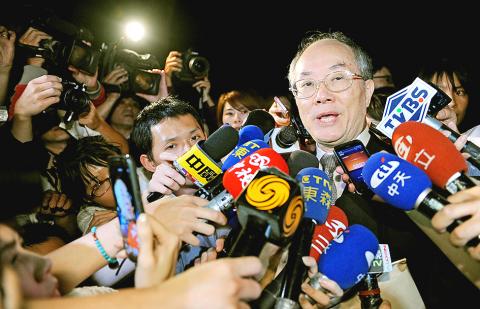The Taipei District Prosecutors’ Office yesterday said it was comparing statements made by President Ma Ying-jeou (馬英九) and three others who were summoned on Thursday evening over allegations that Prosecutor-General Huang Shih-ming (黃世銘) had leaked details of an investigation into a case of alleged improper lobbying by Legislative Speaker Wang Jin-pyng (王金平).
Ma, Premier Jiang Yi-huah (江宜樺) and former Presidential Office deputy secretary-general Lo Chih-chang (羅智強) were subpoenaed as witnesses, while Huang was questioned as a defendant.
The district prosecutors’ office summoned the four after several lawyers and citizens filed lawsuits against Huang, accusing him of leaking secrets in the Special Investigation Division’s (SID) probe when he briefed Ma on information gathered through wiretapping involving Wang and Democratic Progressive Party caucus whip Ker Chien-ming (柯建銘).

Photo: Liu Hsin-de, Taipei Times
The prosecutors summoned Ma to clarify the details of meetings he had with Huang on Aug. 31 and Sept. 1, five days before Huang called a press conference to accuse Wang of misconduct.
The Taipei District Prosecutors’ Office said Ma was given plenty of time to answer prosecutors’ questions. After the questioning, which was conducted from 8pm to 9:30pm, Ma spent more than 10 minutes reading his testimony before signing it, the office said.
The office added that prosecutors offered the president a travel fee for coming in to present his statement, but Ma declined, saying he traveled by foot.
Taipei District Prosecutors’ Office spokesman Huang Mo-hsin (黃謀信) said prosecutors were busy comparing the four statements and the office has not decided whether it should arrange a confrontation meeting for all parties.
Separately, Deputy Minister of Justice Chen Ming-tang (陳明堂) said the ministry’s task force set up to investigate the wiretapping controversy has interviewed experts from Chunghwa Telecom Co (中華電信) to learn more about technologies involved in wiretapping.
Chen said their statements would be compared with those made by SID prosecutors, as well as experts from the Ministry of Justice’s Investigation Bureau.
Chen added that the task force had questioned SID spokesman Yang Jung-tsung (楊榮宗) and SID prosecutor Cheng Shen-yuan (鄭深元), but it has not decided whether to question Huang.

CHAOS: Iranians took to the streets playing celebratory music after reports of Khamenei’s death on Saturday, while mourners also gathered in Tehran yesterday Iranian Supreme Leader Ayatollah Ali Khamenei was killed in a major attack on Iran launched by Israel and the US, throwing the future of the Islamic republic into doubt and raising the risk of regional instability. Iranian state television and the state-run IRNA news agency announced the 86-year-old’s death early yesterday. US President Donald Trump said it gave Iranians their “greatest chance” to “take back” their country. The announcements came after a joint US and Israeli aerial bombardment that targeted Iranian military and governmental sites. Trump said the “heavy and pinpoint bombing” would continue through the week or as long

TRUST: The KMT said it respected the US’ timing and considerations, and hoped it would continue to honor its commitments to helping Taiwan bolster its defenses and deterrence US President Donald Trump is delaying a multibillion-dollar arms sale to Taiwan to ensure his visit to Beijing is successful, a New York Times report said. The weapons sales package has stalled in the US Department of State, the report said, citing US officials it did not identify. The White House has told agencies not to push forward ahead of Trump’s meeting with Chinese President Xi Jinping (習近平), it said. The two last month held a phone call to discuss trade and geopolitical flashpoints ahead of the summit. Xi raised the Taiwan issue and urged the US to handle arms sales to

State-run CPC Corp, Taiwan (CPC, 台灣中油) yesterday said that it had confirmed on Saturday night with its liquefied natural gas (LNG) and crude oil suppliers that shipments are proceeding as scheduled and that domestic supplies remain unaffected. The CPC yesterday announced the gasoline and diesel prices will rise by NT$0.2 and NT$0.4 per liter, respectively, starting Monday, citing Middle East tensions and blizzards in the eastern United States. CPC also iterated it has been reducing the proportion of crude oil imports from the Middle East and diversifying its supply sources in the past few years in response to geopolitical risks, expanding

Pro-democracy media tycoon Jimmy Lai’s (黎智英) fraud conviction and prison sentence were yesterday overturned by a Hong Kong court, in a surprise legal decision that comes soon after Lai was jailed for 20 years on a separate national security charge. Judges Jeremy Poon (潘兆初), Anthea Pang (彭寶琴) and Derek Pang (彭偉昌) said in the judgement that they allowed the appeal from Lai, and another defendant in the case, to proceed, as a lower court judge had “erred.” “The Court of Appeal gave them leave to appeal against their conviction, allowed their appeals, quashed the convictions and set aside the sentences,” the judges